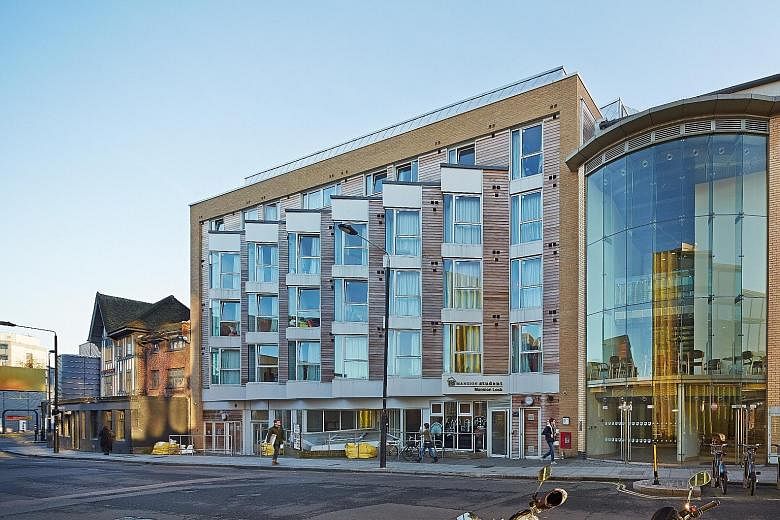The student accommodation sector in Britain continues to hold promise for operators, despite uncertainties around Brexit.
Strong demand from both domestic and international students is expected to continue, thanks partly to the quality of the country's education institutes, observers said.
And Britain's population of 18-year-olds is tipped to grow by an average rate of 2 per cent annually between next year and 2030.
At the same time, its Education Department is aiming to boost the number of international students by 30 per cent - from 460,000 now to 600,000 by 2030 - by dangling sweeteners, such as visa extensions, for those seeking post-study work.
In addition, British universities are proving to be a good alternative for Chinese students, amid escalating tensions between the United States and China.
There have been reports that some Chinese students are facing difficulties in visa applications and extensions for the US.
UOB Kay Hian analysts Lucas Teng and John Cheong noted last month: "UK universities have seen a marked increase in Chinese undergraduate students, with enrolment increasing by up to 9 per cent in 2017/2018... in contrast to a decline seen by US universities, a reversal of the growth trend prior to the Trump administration."
-
30%
Britain's Education Department's target to increase the number of international students - from 460,000 now to 600,000 by 2030 - by dangling sweeteners, such as visa extensions, for those seeking post-study work.
They added that applications for the new academic year show the trend continuing, with Chinese applicants rising 33 per cent year on year in January to a record high.
The data also shows a 6 per cent year-on-year rise in the number of international student applications for the 2019/2020 academic year.
At the same time, there is a lack of accommodation in some cities, said a Knight Frank report: "Full-time student numbers outweigh current bed spaces 3:1."
While 69 per cent of the stock of purpose-built student accommodation beds are owned and operated by universities, Knight Frank believes there are "major opportunities for further private investment".
Meanwhile, the weaker pound has lured international investment and additional applications from non-European Union students.
A separate Knight Frank report showed that global investment into student accommodation hit a record US$16.3 billion (S$22.1 billion) last year, pipping the previous high of US$15.9 billion in 2017.
After the US, the United Kingdom is the second biggest market by investment volume, attracting 31 per cent of total global spending last year. Singapore-based investors in the UK student housing sector include sovereign wealth fund GIC, Mapletree Investments, Singapore Press Holdings (SPH) and Far East Orchard.
The growing investor interest does present some challenges, said Mr Lui Chong Chee, chief executive and managing director of Far East Orchard: "One of our key challenges is increased competition for assets."
Far East's portfolio will hit 2,286 beds in four British cities by the end of the year.
It is on target to reach 3,000 beds by 2023.
SPH has grown its student portfolio to 20 assets totalling 5,059 beds across 10 British cities, translating to assets under management worth around $600 million. It has also set up a centralised marketing and sales office in China.
SPH chief financial officer Chua Hwee Song said: "The strategy is to build the portfolio to a more sizeable platform, which will enhance the recurring income base for SPH."
Centurion Corp has yet to see a fall in EU student numbers.
Centurion chief executive Kong Chee Min noted: "Even if the demand from students in the EU gets impacted by Brexit, we believe the slack will be taken up by China, India and other parts of Asia due to the UK's... reputable higher education institutions."

